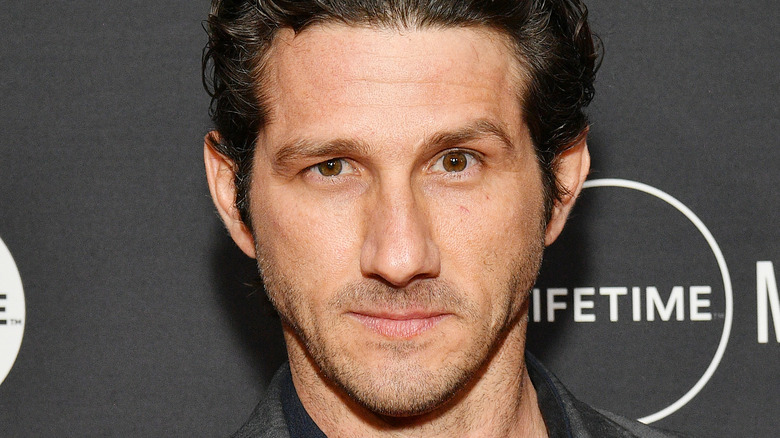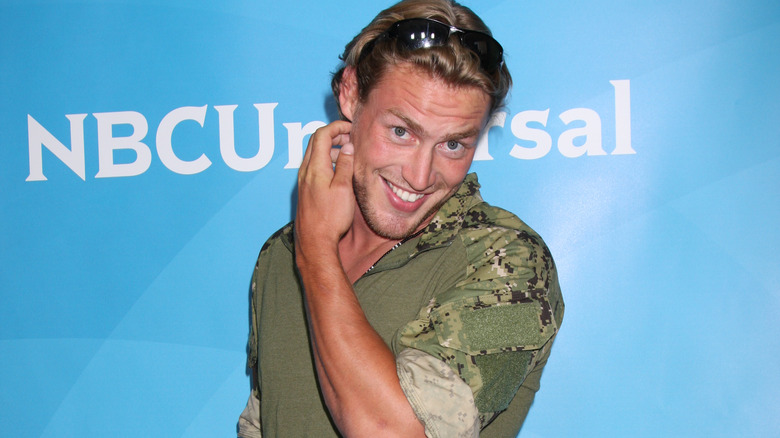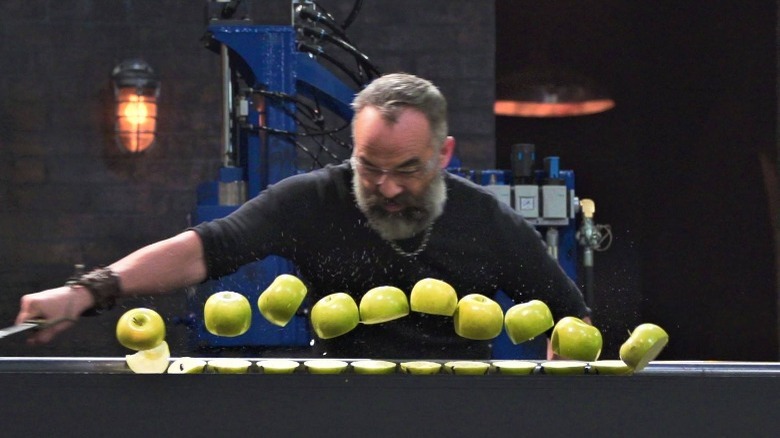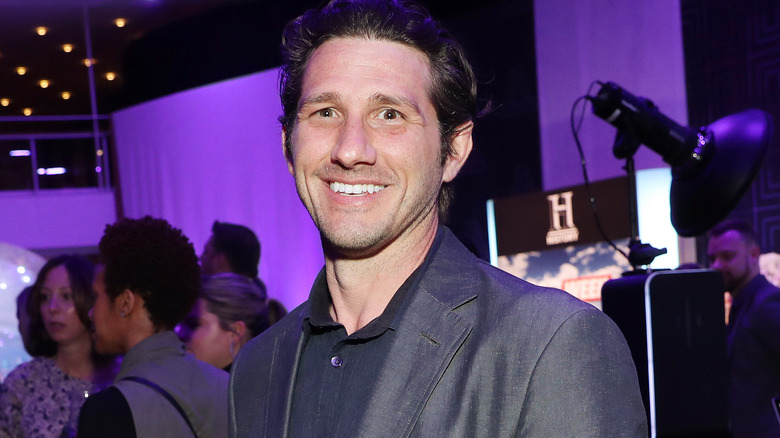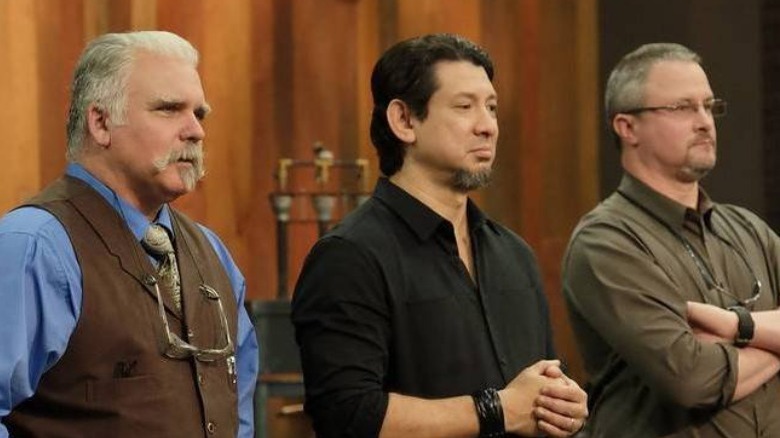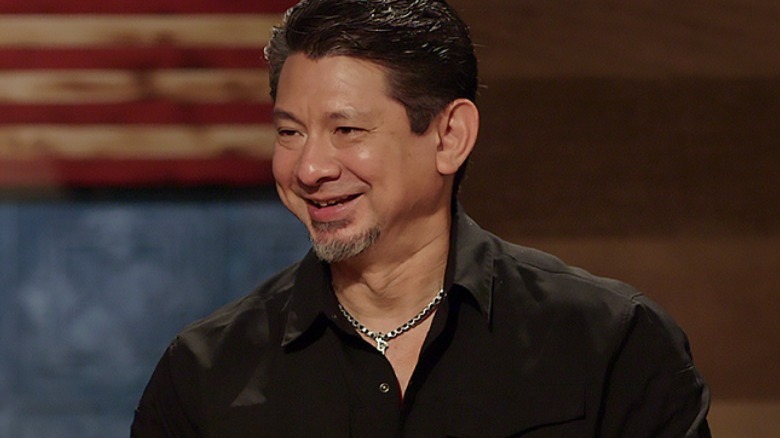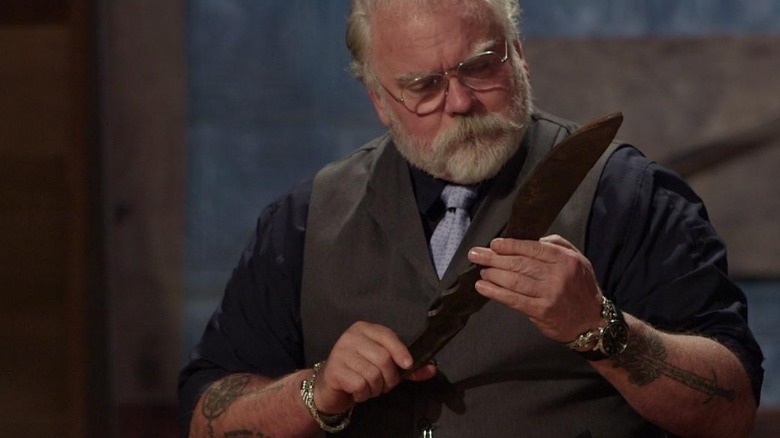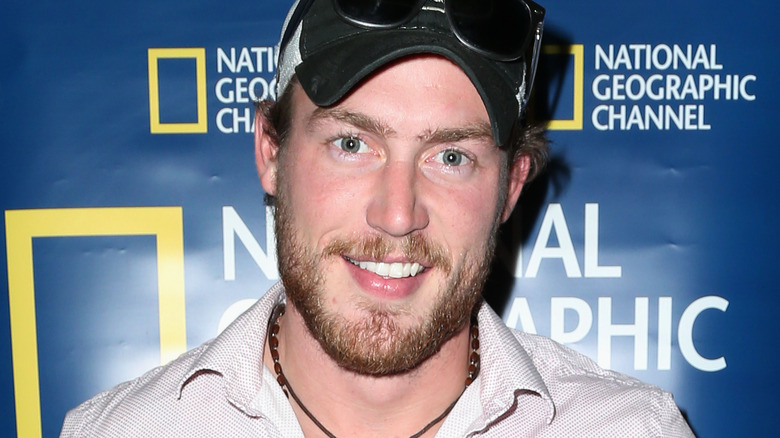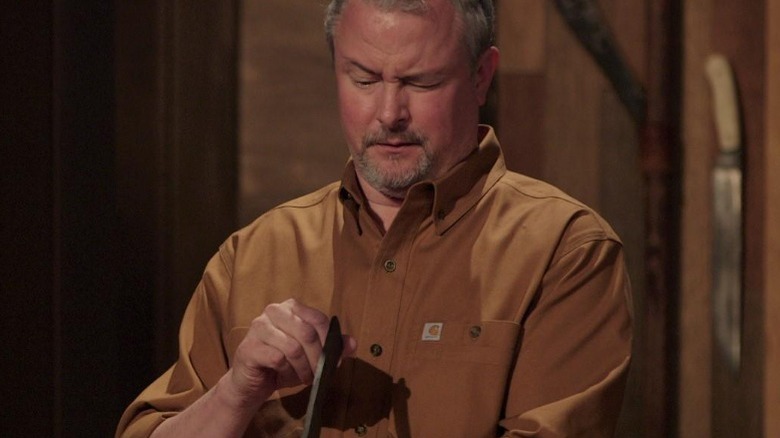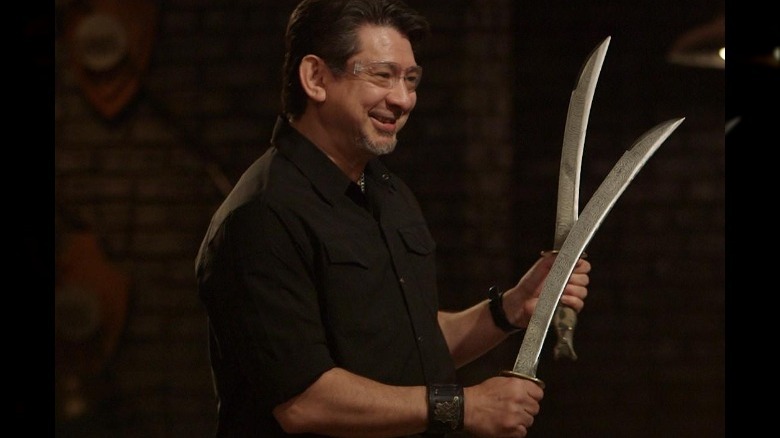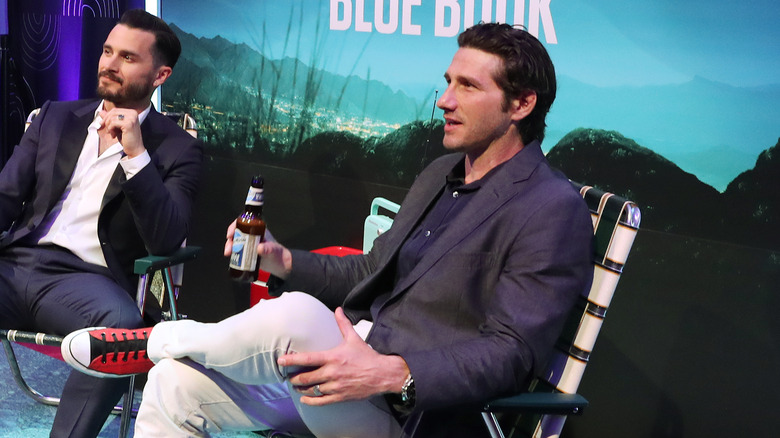The Untold Truth Of The Cast Of Forged In Fire
Reality and competition shows can be considered the bane of television's existence. At some point along our weird timeline, we went from the wholesomeness of Andy Griffith to reality TV, competition shows, and the hate- and vitriol-spewing madness that most of those shows are ... which is possibly why "Forged in Fire" is so popular.
Here, it's all about the craftsmanship, and the incredibly satisfying process of seeing something completely handmade come together from a hunk of metal or some random scraps. And, as Vice discovered when they went behind the scenes of the show, the judges actually want each of the contestants to go through the flames and come out the other side with something brilliant. Judge David Baker even joked that on the rare occasion that a contestant's weapon breaks, he needs to step away for a while to collect himself.
And there's something refreshing about that. The cast of "Forged in Fire" is what makes the show, as clearly, they're incredibly invested in what's unfolding in front of them. There's none of the back-stabbing and the sometimes relentless emotional abuse that unfolds in many other reality and competition shows, and honest? The world needs more kindness. That said, what is it that makes them so dedicated to the craft? Viewers know that they're experts in their chosen fields, but what don't we know?
Grady Powell accidentally discovered his family legacy
Fans were shocked when it was announced that longtime "Forged in Fire" host Wil Willis was going to be replaced with celebrity survivalist Grady Powell. The two hosts do have a lot in common, though, including a military background. How Powell found his life steered into the military was pretty unique, and he told the story to OffGrid.
Powell says that he was in high school when they were learning about the Vietnam War, and it was only then that he was able to connect the dots and understand just what it was that he had seen in his father's closet when he was a child. It wasn't just a regular old hat, it was a Green Beret. His father had been deployed during Vietnam and served with the Green Beret 5th group.
Fast forward a few years, and Powell found himself at the University of Missouri on a full scholarship. Sitting on the sidelines even as the headlines reported on the Global War on Terror didn't sit well with him, though, so he changed his plans. "My heart wasn't in it," he said about school. "What I wanted to do was go join the war effort and put the hurt on some bad guys." So, that's what he did — and the higher-ups saw such potential in him that they fast-tracked him right into Special Forces. It was something he initially refused — saying that he wanted to earn it — but when his father told him to make the jump, he did. He served two combat tours in Iraq and Mali as a Green Beret, before television discovered him.
The show was created by one of the cast ... maybe
According to Decider, the official story behind the development of "Forged in Fire" came from the 14-year-old daughter of History Channel's Tim Healy. Healy — who is the channel's vice president and head of programming and development — says that she had been a huge "Master Chef" fan, and suggested taking the format of that show and replacing the cooking with something else. A producer had pitched an idea about a "Project Runway" with guns, so the two were combined into "Forged in Fire." That's the official story, but according to what judge Jason Knight told Blade, the whole thing was actually his idea.
Knight says that "Forged in Fire" is actually based on a competition he and his wife developed for the American Bladesmith Society. He says that his wife took the concept of "Iron Chef" and turned it into a competition they called Battle of the Bladesmiths. Knight says that's what turned into "Forged in Fire," and adds that he was one of the first competitors, in a pilot that never made it to air. He added that he acted as a consultant throughout the first episodes, and noted that he'd never gotten a creator credit.
Knight also says that he has no intentions of returning: "I wouldn't do the show again unless they paid me what I want to get paid. What I want to do is what I'm doing. What I want that show to be, it can't be."
Wil Willis' blade knowledge came from an unlikely source
Original host Wil Willis was definitely no stranger to weapons: As Inverse says, by the time he transitioned into a career on television, he had already served as an Army Ranger and Air Force Pararescueman. Born in Portugal to a military family, he considers his hometown to be "everywhere," but all that military experience wasn't necessarily with blades. That knowledge? It came from somewhere else, and it's not necessarily a place that anyone would guess on the first try.
"I'm an uber-nerd, so I used to read a lot of Dungeons & Dragons types of books. With that comes a lot of armor- and sword-making, so I knew some of the vernacular and a little bit about the process. But, to tell you the truth, until you see it happening, you really can't imagine that this is even possible."
Willis, says Vice, wasn't just a host, though. When they got to go behind the scenes of filming, they found that although he had walked onto set with exactly no experience on the first day, he spent some down time learning the craft. At the time, he was in the middle of forging a knife as a graduation present for his son, and spent a good amount of time consulting with the judges and getting their expert opinions. And honestly? You'd be a fool not to!
Injuries — and their aftermath — have made it on the show
Weapons expert Doug Marcaida explained to OffGrid that it's a challenge to pick up a weapon for the first time and test it: "it's not a weapon that I have time to 'zero in' or be familiar with." That means he's not entirely sure what he's going to be met with when he starts the testing procedure, and he confirmed that he has gotten hurt. He was in the process of testing a heavy, dull knife when the impact of the strike against a ballistics dummy injured his shoulder. He later posted on his Facebook page that he ended up having surgery to fix the damage that was done — and noted that's why there's a series of episodes where David Baker stepped in and did the sharpness tests. He described it as "Like Sending the car to the shop for an overhaul so it comes out better."
Eagle-eyed fans may have noticed a few other injuries, too ... no pun intended. David Baker showed up on a History Channel special called "101 Weapons That Changed the World" while wearing an eye patch, and he later confirmed on Facebook that it was shot the day after he had a metal splinter removed from his eye. (He's fine.)
And those episodes where J. Neilson vanished? He was having surgery on his hand, and revealed on the Knife Talk podcast (via Distracify) that he had gotten hurt when he slipped on wet grass in his backyard.
Doug Marcaida's philosophy has an unlikely focus
Doug Marcaida's catchphrase is said a lot, and it's something that the show's bladesmiths are just hoping they'll hear after their blade is put through the paces by the professionals. It's is often repeated — and written — as "It will kill," but that's not what he's saying at all. He told Vice: "It's a family show — there are a lot of kids watching — so I changed the 'kill' into KEAL: KE, Keep Everyone, AL, Alive. The show isn't about glorifying violence."
The idea fits in with Marcaida's personal and professional philosophy. In addition to being a knife designer, he's also a U.S. Air Force veteran, respiratory therapist, and now teaches his own style of Filipino Martial Arts. He was interested in the idea at about the age of 8, and when he started training at 16, there was no looking back. That same philosophy is key. Marcaido explained to OffGrid that although FMA is very weapons-based, he taught that the only weapon needed was a person's mind. He also stresses to his students that "it's not about how many you hurt, but how many you can protect."
Also key in his studio is the responsibility that comes with being trained in martial arts, and the ability to apply the good attributes developed with extensive training to other areas of life. He also added that being on "Forged in Fire" was a unique experience: "It's almost as if I've come full circle, because now I understand the creation process."
David Baker does all the final challenges
David Baker has some seriously impressive skills as a bladesmith, and constantly updates his Facebook page with his own work. That said, it's still kind of surprising that he's not just a judge on "Forged in Fire," he participates, too. Kind of.
When Vice got to attend the filming of an episode in 2017, they revealed that everyone who works on the show knows that as difficult as each final challenge might seem, it can be done — and they know it because Baker does them all.
That might be the hardest hurdle, but it's not the only one the contestants face. There are still a few challenges to get through before they even think about the final one, and surprisingly, one of the judges does all of those, too. J. Neilson says that he wasn't hired to be a comedian, he was hired to be the technical guy — and he is. He's also the one that does the first part of challenges before the contestants do, just to make sure they're not just setting everyone up to fail. Challenges are great, but winning has to be a possibility — so, they made sure that it is.
Grady Powell is highly conflicted about his survivalist shows
Before "Forged in Fire," Grady Powell appeared on survival shows like "Stars and Stripes," which saw him working with Chris Kyle. (He says they ended up becoming friends, and called him "hands down, one of the best dudes I've ever known.") He went on to do shows like "Dual Survival" and "Ultimate Survival Alaska," but it's not necessarily something he believes in ... at least, not the way it's portrayed on TV.
When OffGrid asked him about the shows and the message they send, he spoke at length about how "it's produced and that is not real survival; that's backyard survival." He went on to explain that real survival isn't that exciting: the vast majority of it was about conserving energy and waiting. Most of what he did on the shows, he said, was never anything he would do in a real-world situation: The producers want to see it, so "I spend the energy doing it because I know I'm going to be getting out. It's not like I'm going to die. It's a TV show."
He even went as far as describing his conflicted feelings about it. While he definitely wanted to encourage more people to learn to be better prepared for dangerous situations, it bothered him that anyone trying to learn from his shows would be learning the wrong things to do. "It's a catch-22 for me," he explained. "I feel bad sometimes, because I'm portrayed as the guy who's giving people bad advice."
J. Neilson started making knives for a practical reason
It's always fascinating to listen to people talk about what first sparked their interest in the subject that would eventually become their chosen expertise, and by the time J. Neilson did a behind-the-scenes bonus feature for the History Channel, he had been making knives for about 25 years. What started it all?
Conan. Or, less specifically, the sword-and-sorcery movies of the 1980s. He grew up watching movies of distant lands, magic, and knights, but in the real world, there was a bit of a problem. "Nobody's really carrying swords around, so that developed into knives, and you can actually make those, carry it around, and use them."
He was largely self-taught until he attended a knife show and met someone who could actually teach him more about what he was doing. And that? That kind of circles around to his favorite part about "Forged in Fire." Neilson says that it's been countless times where he's watched contestants and wondered what the heck they were doing and thinking, only to have some of those blades work. He says that he's learned a lot from the contestants, and it's kept him grounded in remembering just how much he still has to learn.
Doug Marcaida teaches his own system of martial arts
Doug Marcaida isn't just a knife guy, he's a practitioner of Filipino Martial Arts (FMA), and the founder of a studio that teaches his own style of fighting. It's aptly named Marcaida Kali, and according to his official site, ideals of philosophy, respect, and responsibility are among the more important parts of his teachings. So, what is Marcaida Kali? That's ... tricky.
He answered the question in a Facebook post, only, there wasn't really a direct answer. He wrote (in part): "So i guess Marcaida Kali is a concept of inspired teaching as a guide but also to let people know... you. Can make this up. ... You either know what it is or you don't. ... Of course, you can believe that you know... when in fact you don't."
Not hugely helpful for anyone wanting to learn more, but we can say that FMA is a practice that focuses on defense against edged and blunt weapons, as well as the use of them. There are several different styles — including Kali, Arnis, and Eskrima — and more than that? It'll take a formal teacher to really do it all justice but fortunately, anyone who's interested has plenty of opportunities. There are studios around the country, and Marcaida's students are at the head of a number of them, including classes taught in New York City, Maryland, and at his home studio in Rochester, New York.
Here's why Wil Willis really left
When it was first announced that Wil Willis was going to be replaced as host of "Forged in Fire," everyone involved was kind of mum on what had really happened. The History Channel's official statement was pretty non-committal and referred only to the appearance of new faces on a show that's been on the air for such a long time. But ... what really happened?
In 2020, Willis appeared on the podcast B3F (via Distractify) to talk about a number of things, including his time on — and departure from — "Forged in Fire." Among the first things he mentioned? The monotony of having to do the same thing over and over, the heat and the smell, and the cramped quarters of his tiny, tiny trailer.
He explained what it was like filming the show: "it's the slowest, most boring process in the world." That said, it's possible to see how it might get a little tiresome after a few years of doing it. A single episode would take between three and five days to film, and that's a huge time sink — especially for a new father. About the same time, Willis and his wife welcomed a new baby named Flash Orion, leading many to speculate that not only did he just feel it was time to move on, but spending more time with his infant son may have played a major part in his departure from the show.
